While the landscape is changing for the better, the gym and training environment can still be intimidating for some athletes, especially beginner male athletes that don’t want to be perceived as weak if they ask for assistance or need advice mid-workout. (5) The best fitness apps work to absolve that anxiety with helpful guidance, workout tracking, and motivation — all from your smartphone. The best workout apps for men can be a great tool to keep on-hand when looking to update your training setup, regardless of your fitness level.
While these digital platforms and quality online workout programs aren’t inherently gender-specific — a good fitness app is a good fitness app — there are still some factors that can make the services appealing to a male audience. So, we subscribed to over 40 training plans, compiled our research, and measured each app against one another to determine our favorite workout apps for men available today.
The 10 Best Workout Apps for Men in 2024
- Best Overall Workout App for Men: Future
- Best Workout App for Men for Personal Training: Caliber
- Best Workout App for Men for Classes: iFIT
- Best Workout App for Men for Strength Training: Juggernaut AI
- Best Budget Workout App for Men: BodyFit
- Best Free Workout App for Men: Nike Training Club
- Best Workout App for Men for Logging Workouts: Strong
- Best Workout App for Men for Yoga: Alo Moves
- Best Workout App for Men for Outdoor Workouts: Strava
- Best Workout App for Men for Beginners: Aaptiv
How We Tested
The BarBend team is made up of competitive athletes, certified personal trainers, and lifelong fitness enthusiasts. For this round-up, we subscribed to 42 top-ranking fitness apps and online workout programs targeting personal training, nutrition, and a variety of different disciplines. We brought a multi-point methodology to each app, rating factors such as ease of use, accountability, instruction, and interactivity on a scale of 1 (lowest) to 5 (highest).
During our testing, we experimented with apps incorporating weightlifting, cardio, home workouts, yoga, and other popular workouts. While some platforms provided an immersive, detailed experience with engaging instructors and daily check-ins, others served more as a training log that relied on one’s experience level in the gym rather than beginner-friendly instruction.
Additionally, we looked at how robust the workout libraries were for each app, which can help keep every training session engaging, entertaining, and progressive. We also noted the equipment requirements for each service — could we support a workout with simple bodyweight exercises, or did we need access to a full-fledged gym or a personal training space filled with our home gym essentials?
Naturally, cost was also considered in the curation of this guide. After all, is an app truly a worthwhile download if its performance doesn’t earn its price?
Ready to comb through the app store for a new training partner? Let’s dive into our findings.
Best Overall Workout App for Men: Future
Future Online Personal Training

Future Online Personal Training
Future offers online personal training in every facet of fitness. Every client gets a certified fitness professional who will prescribe training programs, follow up daily to assess progress, make program adjustments as needed, and offer accountability.
Specs
- Price Per Month: $199
- Training Discipline: Strength and Conditioning
- Equipment Required: Bodyweight, Home Gym, or Commercial Gym
- Available On: iOS, Android
Pros
- You’re paired with a personal trainer of your choosing after a quick initial survey for a complete, customized training routine.
- Post-workout check-ins allow you to alter your routine based on travel, injuries, and progress.
- Our tester said this platform pairs well with an Apple Watch for seamless tracking and extra motivation.
Cons
- At nearly $200 per month, Future is one of the more expensive workout apps for men we’ve tested.
- There’s no real-time coaching available, which may dismay athletes who want immediate feedback on form and performance.
- Those who prefer group fitness classes or on-demand workouts should opt for a different service.
For male athletes wanting an immersive, personalized workout regimen at their fingertips, we view Future as one of the best fitness apps on the market (err, App Store). The app pairs you with a personal trainer of your choosing that helps curate a plan that’s aligned entirely to your goals. Reports indicate that a majority of clients utilizing personal trainers are men, meaning this could be a popular option for male athletes looking for that customized experience. (6)
Upon signing up for Future, you’re taken through a brief survey — a fitness assessment of sorts — to get a handle on your personal goals, experience levels, available equipment, and other metrics. From there, you’re given suggestions on which coach fits your workout needs best. According to our tester, a certified personal trainer, the suggestions are accurate, but they also appreciate that you can do your own research and choose from the Future’s roster of available trainers, if you so choose.
Kate Meier, BarBend editorial member and NASM-Certified Personal Trainer, said the app experience is exceptional when it comes to ease of use, rating it 4.5 out of 5.
“I enjoyed how available my coach was for assistance from the start. For example, I had some issues in finding the ‘pause’ button at first for some added warmup time, but my personal trainer was right there to guide me to its location,” she notes. “I also appreciated the visual and audible instructions during workouts. I think this is a great way to cater to both visual learners and more experienced athletes.”
We also like how Future can be adjusted throughout your fitness journey based on how you’re feeling and where you’re taking your workouts. We attribute this to the excellent interaction you have with your coach, which we rated a 4 out of 5. Our tester, a CrossFit Level 1 Instructor, used Future during a beach vacation that took them away from their normal free weights and home gym machines.
“To accommodate my travels, my coach gave me bodyweight workouts since I didn’t have any of my typical equipment with me,” they said. “I enjoyed how simple it was to switch up my routine, and the communication between athlete and trainer is top notch.”
Future is an excellent tool for personalized training, and pairs seamlessly to an Apple Watch (and other fitness trackers), according to Meier. That said, it’s not a direct substitute for in-person guidance. There’s no real-time feedback from your coach during exercise, meaning you’ll need to record your movement and then send it to your trainer for any corrective guidance. Our testers had no real complaints about this format, but it may be too lagging of a structure for athletes wanting immediate feedback mid-set.
Finally, we’d be remiss not to speak on the monthly subscription cost of this app. At $199 monthly, Future is not the most budget-conscious download — especially if you’re an athlete that doesn’t enjoy the personal trainer experience. That said, in-person trainers can range in price from $25 to $100 hourly, so Future may earn its price in the long run. (1) This workout app is still an investment, but it could be a worthwhile option for men wanting that customized fitness experience.
Read our full Future App Review.
Best Workout App for Men for Personal Training: Caliber
Caliber

Caliber
With two coaching subscriptions to choose from (one group oriented and one individualized), Caliber can be an excellent tool for guiding your fitness journey. The prescribed workouts can be tailored to your available equipment, and you’re in constant communication with your personal trainer through the app’s chat feature and video call capabilities.
Specs
- Price Per Month: Starting at $200
- Training Discipline: Strength Training
- Equipment Required: Bodyweight, Home Gym, or Commercial Gym
- Available On: iOS, Android
Pros
- Caliber’s one-on-one personal training plans offer customized workout programs.
- The workout app also provides suggestions for boosted nutrition, sleep, hydration, and mobility.
- Caliber also offers a group-oriented subscription package for $19 monthly, as well as a free version covering basic workout instruction and exercise logging.
Cons
- The personal trainers are certified nutrition coaches, meaning the nutritional guidance is more general than customized to your specific needs.
- The app mostly focuses on traditional strength training, so those looking for more cardio-focused workouts may feel underserved.
- Uploading photos for coach-oriented feedback can be taxing, according to our tester.
Looking for a personal trainer to help guide you toward your fitness goals? Caliber’s roster of dedicated professional coaches can help you hit your marks in training and beyond. The introductory survey was quick and painless, with our tester, a certified personal trainer, matching up with a respectable, knowledgeable coach in no time. In terms of setup, they rated it a 5 out of 5.
For the sake of this round-up, our tester trialed the Premium version of the app, which is where you can get one-on-one personal training. Caliber also has cheaper subscriptions that follow different workout structures and in-app capabilities (more on those later). Speaking to the Premium version, they gave the service a 5 out of 5 when it comes to both instruction and workout accountability across their structured weekly programs and daily workouts.
“I found the video demos for each movement to be very well-done, and I liked how much communication you have with your prescribed coach,” they noted. “You also get weekly asynchronous check-ins, which might be my favorite part of the app experience. My coach would give me feedback along with incremental goals each week, which really kept me motivated.”
Caliber’s personal trainers can also be helpful for male athletes wanting assistance when it comes to their nutrition, sleep, hydration, and mobility. Be mindful, though, that the coaches are certified nutrition coaches — not registered dieticians. This may seem like a small title difference, but CNCs operate in general nutritional advice, so while they can be helpful in learning how many calories you should eat in a day, they cannot provide customized meal plans or other individualized routines.
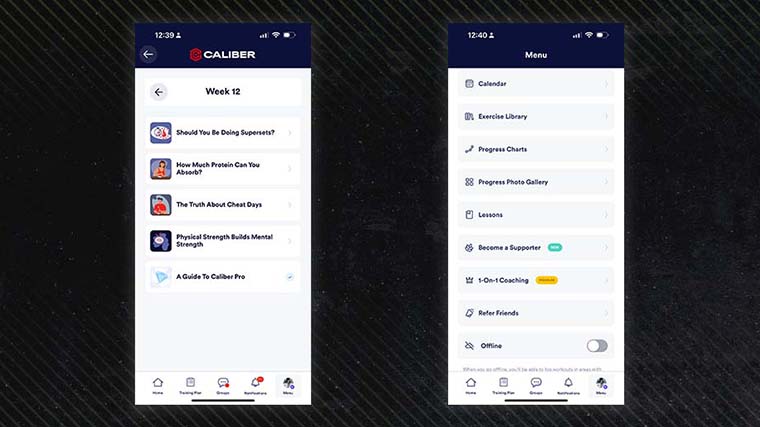
While Caliber’s premium one-on-one personal training subscription earns the app its moniker in this guide, we’d be hard-pressed to not mention the other packages available on the platform. Caliber offers a group-oriented fitness subscription for $19 monthly, as well as an always-free version of the app that lets you to track your workouts and engage with its library’s more than 500 exercise classes.
Of course, the paywall between the three available subscriptions limits how much the app has to offer at the free, $19 per month, and $200 per month price points, but the varied levels are a nice touch for different budgets and training preferences.
Is Caliber going to be the answer for every athlete? No. In testing, we found that most workouts centered around traditional strength training, which may be less ideal for cardio enthusiasts or dedicated runners. If you are looking for an added sense of support for your next lifting session, though, it’s worth the subscription, in our opinion.
[Related: The 8 Best Online Personal Trainers of 2023]
Best Workout App for Men for Classes: iFIT
$25 Off
IFIT Class Subscription
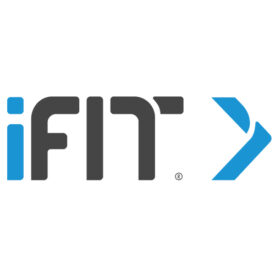
IFIT Class Subscription
The iFit app features a library of over 16,000 live and on-demand classes that range from mental health and recovery to rowing, running, HIIT and strength classes. You can get the full studio experience virtually through iFit, and is a great boost to any home gym set-up — with or without equipment.
Specs
- Price Per Month: $39
- Training Discipline: Cardio, Strength Training, Yoga, Pilates, Mindfulness, Barre
- Equipment Required: IFIT-enabled Cardio Machine, Bodyweight, Dumbbells, or Exercise Mat
- Available On: iOS, Android
Pros
- The library of live and on-demand courses contains over 17,000 classes dedicated to cardio, yoga, strength training, and more.
- iFIT is compatible with cardio machines from NordicTrack, ProForm, Freemotion, and Matrix for on-equipment streaming.
- The app offers regular challenges for an added zest of entertainment and motivation.
Cons
- You may need to purchase an iFIT-compatible machine to get the most out of the app.
- Men wanting a personalized workout plan may want to opt for a more individualized app experience.
- Our tester said the home screen can feel busy at first with a lot of information upfront.
Okay, so maybe you enjoy a shared experience when it comes to your workouts. For athletes wanting that class-like structure to each sweat session, iFIT is tough to beat. The app — available for both iOS and Android — offers over 17,000 live and on-demand fitness classes across multiple disciplines, including cardio, weight training, yoga, pilates, barre, and more. Our tester, a certified personal trainer, also loved its charismatic trainers, rating the app’s overall instruction a 4.5 out of 5.
The iFIT experience is truly unlocked, however, when you pair a subscription to a compatible piece of fitness equipment from NordicTrack, ProForm, Freemotion, or Matrix. These brands make some of the best cardio machines for home fitness and the iFIT integration allows you to seamlessly stream your favorite sessions mid-workout.
This integration also allows you to take advantage of iFIT’s AutoAdjust feature, which is available on several of their machines. AutoAdjust automatically adjusts your machine’s resistance to the recommendations of trainers during classes or the terrain during scenic rides. This way, you can focus on your sweat without having to fiddle with settings.
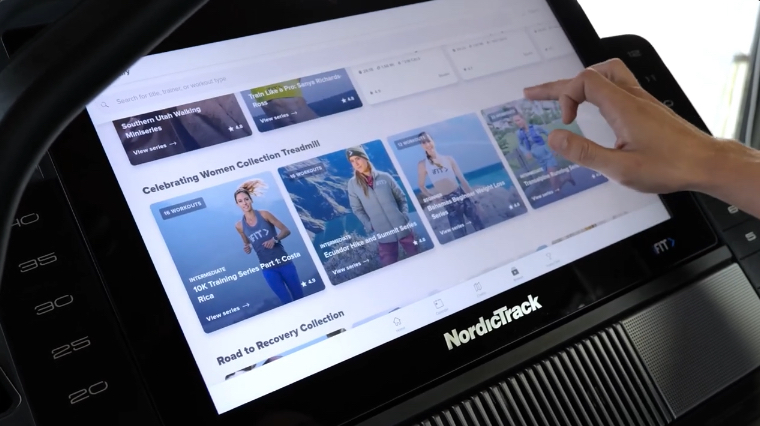
It’s an impressive feature, but making the most of iFIT may mean shelling out an additional chunk of change for a compatible machine in addition to the $39 monthly subscription. As such, we rated its equipment demands a 4 out of 5.
According to our tester, a certified personal trainer, the instructors provide excellent guidance throughout your workouts, bringing a good sense of energy and engagement that makes you want to return to the platform day in and day out. We rated iFIT a 3.5 out of 5 for accountability, though, because your regular use of the service is highly reliant on your interest in the classes.
“I found that the app was mostly self-guided, meaning you didn’t have any notifications or check-ins to work out like you’d have with other services,” they said. “The app does offer challenges, though, which can help you hit any pre-set milestones for strength or weight loss. There’s even a post-accomplishment email to congratulate you on the progress.”
Our tester also said that it helps to take a few minutes before hopping into an on-demand course to make sure you have everything you need to complete the workout. Equipment lists can be buried in the details at times, so it’s best to take some pre-workout precautions and read through everything to avoid multiple pauses to grab a forgotten resistance band or set of dumbbells.
Read our full iFIT Review.
Best Workout App for Men for Strength Training: Juggernaut AI
Juggernaut AI

Juggernaut AI
This AI-powered strength training app curates workouts for you based on your initial fitness levels and daily readiness. The more you log your data, the more your algorithm learns in an effort to keep you progressing through PRs.
Specs
- Price Per Month: $35
- Training Discipline: Powerlifting
- Equipment Required: Free Weights, Barbell, Squat Rack, or Commercial Gym
- Available On: iOS, Android
Pros
- Juggernaut AI tailors your training routine around progressive overload to help build muscle efficiently. (2)
- The initial AI-powered fitness assessment is thorough and detailed, resulting in unique programs tailored to your needs.
- Daily readiness prompts help curate your workouts around your motivation, fatigue, and energy levels.
Cons
- This training app requires more access to gym equipment like barbells and free weights than other platforms we’ve tested.
- If you’re looking for help building a cardio routine, you’re out of luck.
- The service is AI-powered, so those looking for a trainer-led experience will want to look elsewhere.
Since studies indicate that male athletes are more prone to take up strength training as a dedicated fitness discipline, men may find themselves drawn to Juggernaut AI. (7) Using the power of artificial intelligence, this platform curates lifting programs specifically to your wants and needs, resulting in a workout that rivals the experiences we’ve had with human personal trainers.
According to our tester, a certified personal trainer, Juggernaut AI begins demonstrating its value with a thorough fitness assessment once your subscription kicks in, earning it a 5 out of 5 for the setup process. “I was surprised to see how in-depth the Expert System AI was when it came to building my program full of worthwhile exercises,” they said. “After entering your fitness experience, PRs, weak points, typical recovery time, and other metrics, the platform creates a detailed regimen in no time.”
We also enjoy how Juggernaut AI takes the strength training programming further with daily readiness prompts. These surveys ask you about your motivation and fatigue levels before hitting the gym, and then makes any needed adjustments to your recommended blueprint without hesitation.
Juggernaut AI focuses on strength training through progressive overload — one of the best methods for supporting muscle growth and strength increases. (2) With this in mind, it’s best to have access to the typical tools of the trade. Our tester recommends, at the minimum, a squat rack, bench, barbell, and weight plates. For these reasons, we gave Juggernaut AI a 4 out of 5 when it comes to equipment requirements.
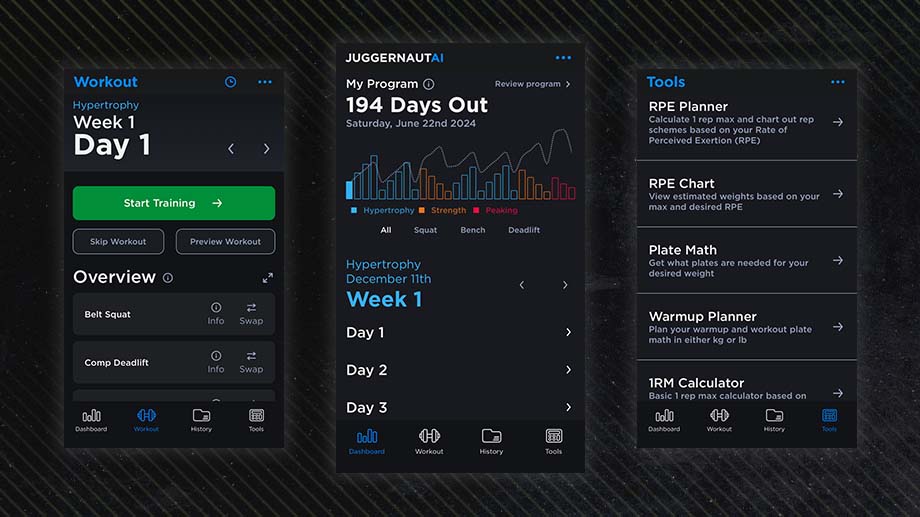
Finally, when it comes to using the app itself, our tester enjoyed how intuitive it was. “You’re interacting with the service a ton,” they noted, so you can quickly get a feel for everything after just a few workouts. While the visuals may not be for everyone — our tester was disappointed with the lack of a light and dark mode — it can be a positive experience, nonetheless.
Plus, it’s worth noting that Juggernaut AI is AI-powered, so while the interaction is scaled up with the app, it’s not as personable as the experience you’d have with a human coach. For this reason, we rate it at 3 out of 5 for interactive features — still a decent score for an app with no human on the other side of your conversation.
[Related: The Ultimate Guide to Strength Training (and How to Get Started)]
Best Budget Workout App for Men: BodyFit
BodyFit
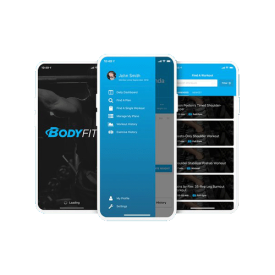
BodyFit
This impressive workout app packs in plenty of workout programs and instruction for less than $7 per month. Subscribers gain access to over 90 dedicated fitness regimens for a slew of targeted goals like muscle gain and fat loss — and a discount on Bodybuilding.com purchases doesn’t hurt, either.
Specs
- Price Per Month: $6.99
- Training Discipline: Strength Training
- Equipment Required: Home Gym Equipment or Commercial Gym
- Available On: iOS, Android
Pros
- The app costs less than $7 per month — one of the lowest subscription prices we found in testing.
- Your membership grants you access to more than 90 full fitness plans for muscle gain, fat loss, and more.
- The included exercise instruction is rich with detail, including visual pictures, videos, and detailed guidance.
Cons
- Our tester notes that there’s little accountability outside of general push notifications.
- Equipment needs can vary by program, so you’ll need to choose a workout based on what you have at your disposal.
- According to our tester, some of the exercise names can be difficult to comprehend.
Workout apps don’t need to break the bank, despite some services costing hundreds of dollars each month. Take BodyFit, for example. This impressive platform is filled with over 90 full-fledged training programs written by some of the industry’s most recognizable names, including Jim Stoppani, Kris Gethin, and Jamie Eason.
With a roster this star-studded, you’d expect the cost to follow suit, but a monthly membership to BodyFit is just $6.99 — enough to earn its spot as our favorite budget-friendly workout app for men and a 4.6 out of 5 for pricing. For reference, other apps like IFIT and Juggernaut AI can cost you up to five times as much.
Having used BodyFit in the past, I can attest to its effectiveness in delivering worthwhile instruction. I’ve found the multi-layered guidance (textual, auditory, and visual) for each prescribed exercise to be top notch, which is why I rate BodyFit a 5 out of 5 for the category.
The level of detail in the guidance is also quite impressive. Naturally, this can vary from program to program, but I’ve yet to find a program that’s left me with a sense of confusion when it comes to how to perform each movement.
The same cannot be said, however, when it comes to some of the exercise names. There have been multiple instances where a certain exercise has been given a convoluted moniker, which can lead to some challenges when trying to follow along to a given routine. It’s a minor inconvenience that I’ve learned to adapt to over regular use, but it can sometimes be difficult to decipher all of the training regimens when trying to choose a program for your needs and wants.
Additionally, while we admire BodyFit for its approachable price point, this may not be the best workout app for beginner athletes that require extra motivation to get to the gym. According to our tester, a certified personal trainer, the baked-in accountability is nearly nonexistent outside of a few push notifications. “Even when opting for the push notifications, they’re few and far between,” they noted. For this reason, we rated BodyFit at 1.5 out of 5 for the category.
Despite its lack of check-ins and motivation, BodyFit can still be a fruitful solution for those wanting to add some structure to their routines. There’s a ton of guidance and resources available to help you nail your new workouts, and there’s even the convenience of discounted supplements and apparel through bodybuilding.com — the app’s parent company. So, in theory, this budget-friendly app download can lead to further cost efficiency when it comes to building out a well-rounded fitness arsenal.
Best Free Workout App for Men: Nike Training Club
Nike Training Club

Nike Training Club
Thanks to a wide variety of periodized regimens as well as live and on-demand fitness classes led by certified personal trainers without any cost of entry. The Nike Training Club caters mostly to strength-based training, but also has sessions for bodyweight training, yoga, pilates, and mobility work.
Specs
- Price Per Month: $0
- Training Discipline: Strength Training, Yoga, Pilates, Mobility
- Equipment Required: Bodyweight or Home Gym
- Available On: iOS, Android
Pros
- The entire library of periodized workout plans, live classes, and on-demand courses is free.
- Setting up the app is simple — just download the service and get into a workout.
- Nike Training Club also offers helpful recipes and blog posts, as well as a social feed for added training motivation.
Cons
- Training accountability is limited to just push notifications.
- This app is suited more for beginners than seasoned athletes.
- Our tester noted legibility issues with on-screen metrics like reps and workout time.
Of course, a workout app that’s free is going to be the ultimate budget pick, right? Well, Nike Training Club pairs that wallet-friendly feature with a platform that’s actually effective and enjoyable. We’ve been high on NTC since the pandemic when Nike ultimately (read: rightly) decided to open its platform to the masses with a free service offering a plethora of trainer-led workouts and exercises.
In testing and using Nike Training Club, we’d be remiss to ignore how simple it is to get into a sweat session with the app. Our 5 out of 5 rating for ease of use stems heavily from the simple setup you experience after download. Once the service hits your home screen, a workout is just a few taps away.
Additionally, our tester, a certified personal trainer, commended Nike’s investment in making the app as simplified as possible. “I really enjoyed how easy it was to navigate across the app,” they noted. “Getting into the workouts, blog articles, recipes, and motivational social feed was a breeze.”
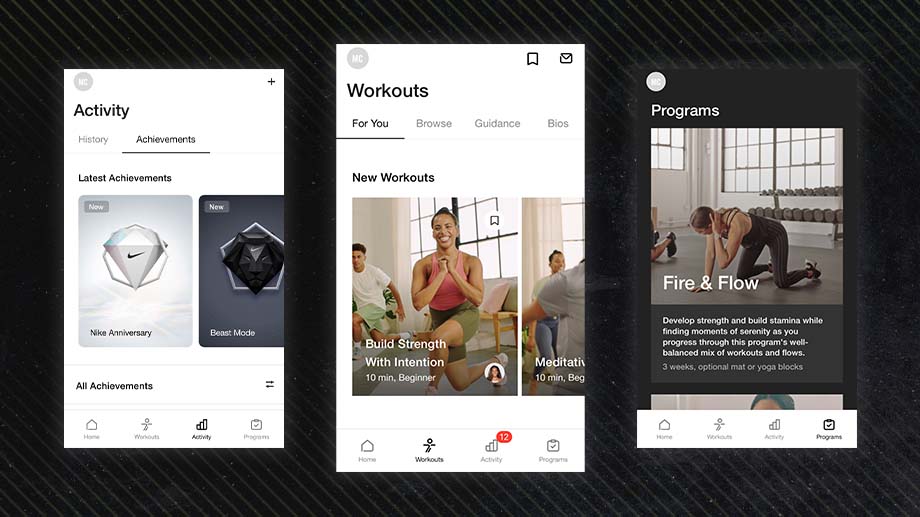
Nike Training Club is also approachable given the variety of workouts available across the app. While there are more equipment-focused sessions available than bodyweight exercises, there’s still a good selection of movements. We appreciate this as it’s less of a burden when it comes to choosing a workout for the day, and it’s why we rate NTC a 4 out of 5 for equipment demands.
That said, though, you’ll need to make a commitment to using the app itself. Unlike other workout apps we’ve tested, there’s no true sense of accountability outside of a few push notifications, hence our 3.5 out of 5 rating for the category. You’ll need to want to use the app day in and day out, as opposed to having a dedicated coach or personal trainer pushing you to hit the weights.
Additionally, our tester noted that the usability of the app is somewhat limited, which we’d expect with any free service. According to their notes, some of the tracked metrics like reps and workout time were hard to read at times, which can lead to confusion during sessions. Still, it’s hard to criticize the value at hand — other “pay for play” services are light years away from the quality of NTC.
[Related: Nike Unveils ‘Nike Strength’ Brand, Will Produce Strength Training Equipment]
Best for Workout App for Men for Logging Workouts: Strong
Strong
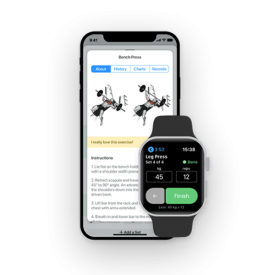
Strong
For advanced athletes looking for an intuitive way to log their workout sessions, Strong can be a viable solution. The library of over 200 exercises is easy to work through, and the $4.99 monthly subscription is more approachable than many other platforms on your dedicated App Store.
Specs
- Price Per Month: $4.99
- Training Discipline: Strength Training
- Equipment Required: Bodyweight, Home Gym Equipment, or Commercial Gym
- Available On: iOS, Android
Pros
- Interacting with the platform is simple and intuitive with clean interfaces for tracking your metrics.
- The “Pro” version of Strong allows you to track key metrics like body fat percentage, muscle group measurements, and more.
- The app boasts over 200 available exercises that can be added to your saved routines for easier tracking down the road.
Cons
- Athletes wanting a more involved setup with on-demand classes and personal training should look elsewhere.
- There’s no accountability present in the form of push notifications or daily check-ins.
- Beginner athletes may feel intimidated by the app interface.
Try as we might, logging your strength training workouts with the best fitness trackers and sensors is still a challenge in itself, which leads many athletes back to the tried and true pen and paper for logging sets and reps. Well, Strong is a workout app that takes the pain out of workout logging, offering up a clean interface with over 200 available exercises to choose from for more efficient tracking throughout your journey.
I’ve been using Strong for multiple years now and commend its simplicity. Building out a workout regimen is easy through the library, and I appreciate how you can plan ahead for future workouts by saving templates.
Additionally, I give this workout app a 4 out of 5 when it comes to value. You don’t get the personalized training experience like you would with other services, but for $4.99 per month, it can go a long way in showcasing progress in given exercises. I’d also highly recommend purchasing the “Forever” package — a one-time $99.99 purchase that gives you complete access to the services at hand rather than the monthly subscription charge.
In using the Strong app, I also appreciate the included instructions for each listed exercise. The provided information has served as a solid resource over time, but I do attribute my experience to my foundational knowledge of strength training, which is why I rate Strong’s app instruction at 4 out of 5. I can see where more novice athletes may feel overwhelmed with the instruction, as well as the accountability at play when it comes to planning future workouts.
Speaking of accountability, there’s practically no features to support continued usage of the app itself, earning it a 1.5 out of 5 rating. You need to be dialed into daily training and regular workout logging, which is why I recommend this platform for intermediate or advanced lifters. Beginners needing that extra motivation to hit the gym every day may feel underwhelmed when relying on the app alone.
Is this workout-supporting service for everyone? No. Does it beat lugging around a journal or trying to decipher poorly-kept notes across your iPhone? 100 percent, yes.
[Related: The Importance of Logging Workouts]
Best Workout App for Men for Yoga: Alo Moves
Alo Moves

Alo Moves
For beginner and experienced yogis alike, Alo Moves can be an excellent download offering over 170 flows and sessions across a wide range of yoga categories. Additionally, the app has other programming for pilates, barre, HIIT, and strength training with new modules being added daily.
Specs
- Price Per Month: $12.99
- Training Discipline: Yoga, Pilates, Barre, HIIT, Strength and Conditioning
- Equipment Required: Exercise Mat, Yoga Blocks, Yoga Straps, or Free Weights
- Available On: iOS
Pros
- The 171 available yoga series can be great for all experience levels.
- New yoga, pilates, barre, HIIT, and strength training workouts are added daily.
- This app can be an excellent option for athletes low on available equipment.
Cons
- According to our tester, the library has more individualized workouts than templated programs.
- The app, naturally, is focused on yoga, meaning there’s less workout variety than other platforms we’ve tested.
- Our tester noted that the notifications are somewhat pointless since they don’t pertain to regimented training.
Studies indicate that more and more men are adopting yoga as a supplementary activity to their regular fitness routines. (3) As such, it helps to have an assisting platform at the ready for both beginner and advanced flows. Enter Alo Moves — an excellent workout app for athletes wanting to improve their overall wellness through the intricate poses and stretches associated with the tradition-rich discipline.
In testing, we counted over 3,000 individual programs tailored to yoga, pilates, and barre, along with series for HIIT and strength training. Beginning and advanced yogis should have no trouble finding a class suited to their needs. Additionally, according to our tester, “Getting into the app interface is simple and intuitive. I took a quick quiz pertaining to my skill levels, and then was given a set of customized class recommendations.” With this experience, it’s easy to see how Alo Moves earned a 5 out of 5 for app setup.
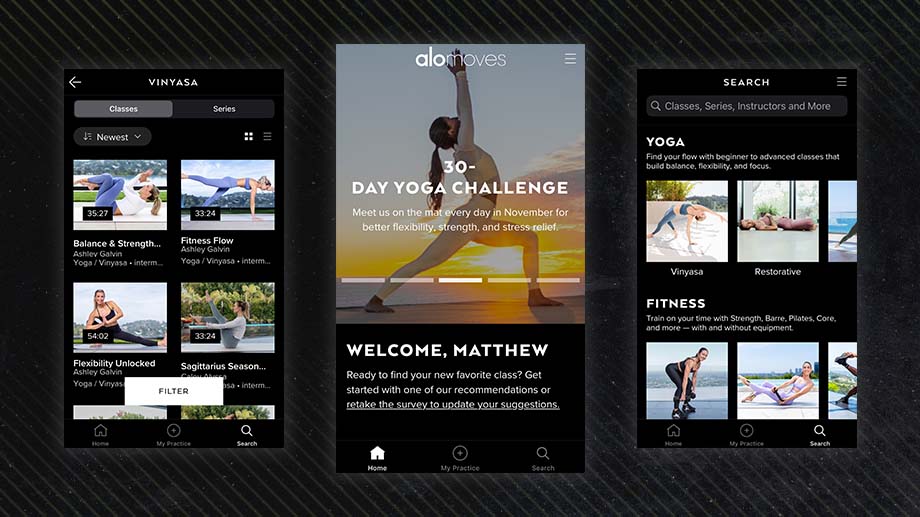
In addition to the easy introduction, we also appreciate the intuitive user interface. Every session is clear in its details for training intensity and duration, so there’s little questioning regarding your chosen flow for the day. Plus, our tester enjoyed Alo Moves’ instructors, saying they provided clear instruction and easy-to-digest guidance.
For more advanced yoga enthusiasts, Alo Moves can also be worthwhile given its unique skill-based library of yoga series. These workouts and flows focus on specific activities and movements like flexibility, allowing you to fine-tune your skill set as you advance further in your fitness journey.
Of course, this workout app is more niche than others we’ve tested (if you couldn’t gather that from the name itself). You won’t find many strength-oriented regimens in the library, which is why we cut a point from its variety score, making it a 4 out of 5.
Additionally, there isn’t any true sense of accountability, earning the app a 1.5 out of 5 for the category. Our tester said, “I didn’t receive any notifications during testing, and I can’t figure out how to adjust the settings. Even if they popped up, I’m not sure what they’d provide given the fact that the app is set up for individual workouts more so than templated programming.”
[Related: How Strength Athletes Can Add Yoga to Their Program]
Best Workout App for Men for Outdoor Workouts: Strava
Strava
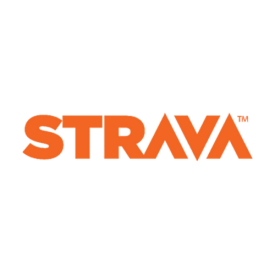
Strava
Popular with cyclists and runners for a reason, the Strava app can be an excellent tool for taking your running to the next level. With a social network, GPS tracking, and loads of data insights, this app is capable of tracking a wide array of physical activities.
Specs
- Price Per Month: $11.99
- Training Discipline: Running, Walking, Cycling, Water Sports
- Equipment Required: Running Shoes or Cycling Equipment
- Available On: iOS, Android
Pros
- The app supports activities like running, trail running, cycling, and water sports like kayaking.
- An integrated social platform allows you to follow along with other Strava users for further engagement and motivation.
- The GPS capabilities show few inaccuracies during operation, according to our tester.
Cons
- The free version of this workout app does little for athletes, meaning a subscription is required to get the most out of it.
- You need to use the desktop version of the service for some features, like pairing your running shoes.
- Athletes looking for a strength-focused fitness app may want to supplement with another service.
Want to take your training into the wild outdoors, yet still need a little connection to the digital world? Strava can support and track your jogs, trail running, and cycling activities without missing a beat (or stride, or pedal). The platform — one of our picks for the best running apps overall — can even support your maritime interests by tracking activities like kayaking, swimming, and sailing.
Our tester, a certified personal trainer, said they enjoyed how Strava offers both a free and premium version, thus catering to a wide range of budgets. “If you’re more of a data hound and want the greatest amount of tracking capabilities, though, I highly recommend the premium version,” they added.
Thanks to its compatibility with a number of the best fitness trackers and running watches, Strava also earns a 5 out of 5 for setup and ease of use. You don’t need to search for a specific brand or operating system, which makes this fitness app a near-perfect fit for most outdoor training enthusiasts.
As far as tracking capabilities are concerned, our tester states that the GPS capabilities are fairly reliable, earning the platform a 4.5 out of 5 for accuracy. “I’ve had a few cycling workouts through downtown Miami where my GPS signal was dropped as I paced through tall buildings, but I’ve experienced the same dilemma with other GPS tracking apps, so I don’t hold it against Strava.”
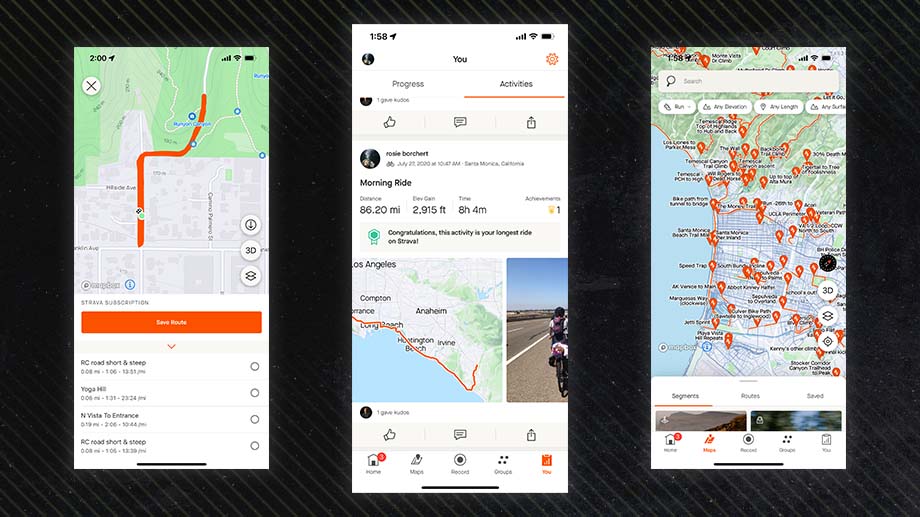
Another unique aspect that separates Strava from the pack is the integrated social network feature that allows you to post your workouts like you would a photo or reel. Plus, you can interact with other Strava users for a community experience that can be supportive, motivating, and downright fun. For interactivity, we rated this workout app a 4 out of 5.
Of course, Strava isn’t going to be an ideal fit for athletes that typically work out at home or who only hit the streets as part of their commute to the gym. If you enjoy some outdoor cardio sessions within your regimen, though, this can be an excellent service to keep you on the right path (literally) and informed on your performance results.
Best Workout App for Men for Beginners: Aaptiv
Aaptiv

Aaptiv
An audio-focused streaming workout app that lets you take your workouts anywhere you want to go.
Specs
- Price Per Month: $14.99
- Training Discipline: Strength Training, Cardio, Yoga, Pilates, Mobility
- Equipment Required: Bodyweight or Home Gym
- Available On: iOS, Android
Pros
- This workout app showcases a clean interface with an easy-to-filter library of bodyweight and equipped exercises.
- Short audio and visual instructions provide workout assistance while also allowing athletes to work at their own pace.
- According to our tester, the available workout programs were curated by a clearly knowledgeable programming team.
Cons
- Athletes looking to lose weight through app assistance may want a platform with additional nutrition resources.
- The app service does not support one-on-one personal training.
- Outside of a basic community feed, there’s little interactivity across the platform.
Workout apps can be excellent tools for beginner athletes who may need some added guidance at the start of their fitness journeys. Thanks to its approachable price point, impressive library of over 2,500 workouts, and integrated community feed for personable advice and motivation, we think Aaptiv can be a great foundational pick for novice gym-goers.
We like how easy it is to filter the available exercises and movements, rating the app 5 out of 5 for ease of use. Workouts can be filtered by duration, training discipline, fitness level, available equipment, and the body parts you’d like targeted. Additionally, the exercises are accompanied by short audio and visual instructions — enough to get you on the right path without feeling overbearing or preachy.
Aaptiv also has a variety of templated workouts that impressed our tester, a certified personal trainer. “You can clearly tell that expert programmers were involved in making these workout plans,” they said in reference to their 4 out of 5 rating for Aaptiv’s instruction and 4 out of 5 for workout variety.
“For example, I did a completely contralateral session using off-balanced weights (heavier in one hand or weight in just one hand). This is something only a knowledgeable, experienced trainer would suggest.”
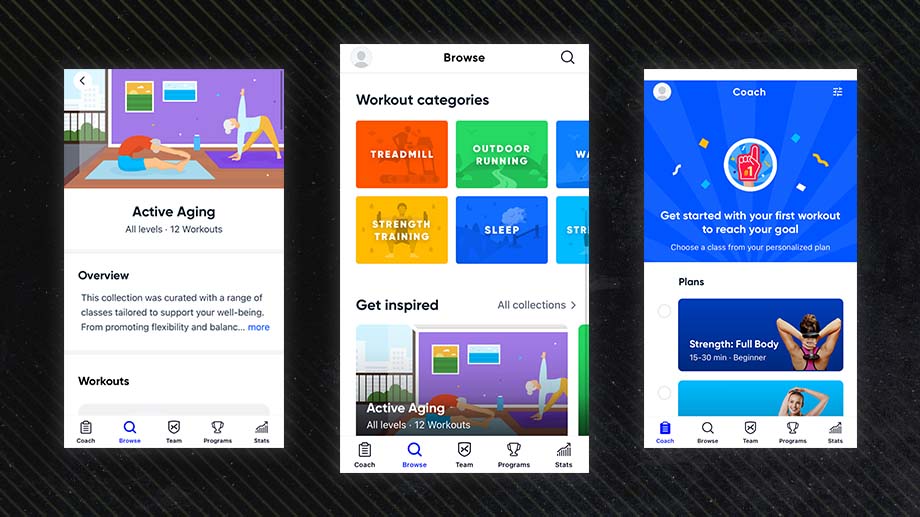
Unfortunately, though, that expert-led insight is limited to training. Aaptiv doesn’t have any information on nutrition, which makes this a less-supportive option for beginner athletes on a weight loss journey. After all, losing weight is best achieved through a combination of proper nutrition and regimented exercise. This platform simply doesn’t have the resources to support both pillars.
Additionally, novice athletes that want further interactivity and support may feel underwhelmed with this service, which we rate at 3 out of 5 for interactive features. There’s no one-on-one personal training available, and while there is a community feed for a social aspect, our tester noted that the feature is pretty basic when compared to other platforms.
Aaptiv can still be a worthwhile download, especially for gym-goers just getting their feet wet in fitness, but if you’re looking for these extra conveniences, it may be best to opt for a different service included in this round-up.
[Related: 12 Fitness Tips to Start Your Journey Right]
How We Chose the Best Workout Apps for Men
In determining our favorite workout apps for men, we took a multi-layered approach to testing across a wide range of platforms and disciplines. After all, every athlete’s tastes will be different, so we sought to include as many supportive services as possible to help you get the most out of your digital training assistant.
We looked at factors including how easy each app was to use and navigate, how reliant the programming was on specific fitness equipment, how varied and engaging the available workouts were, and (of course) how expensive or budget-friendly the subscription costs were. Below you’ll find more in-depth explanations on how these components played into our curation process.
User Experience
Ever download an app only to never open it again after a bad experience with lagging home screens, constant ads, and glitchy useability? Those are the exact dilemmas you don’t want to encounter with a platform designed for keeping you motivated in training. As such, we took a deep dive into each workout app we tested to see how intuitive the controls were and if the service could be a benefit to our programming rather than a detriment.
We also viewed each interface from a creative standpoint to see if the information was legible, digestible, and effective in supporting our fitness goals. If an app was detailed and informative, yet the resources were difficult to read or decipher, we made note of it in our findings.

Bonus points were also given to fitness apps that emphasized accountability, meaning they actually pushed us to stay active. We like to think that our training willpower is strong, but we understand that each day can potentially be a struggle when it comes to mustering up the energy for a workout. If your app is pinging you to log a set or complete your daily template, we think that’s a positive feature.
[Related: 5 Ways to Find Your Motivation for Fitness Again]
Workout Versatility
Keeping your workouts fresh and engaging can go a long way in maintaining a proper schedule throughout your fitness journey. So, we looked for workout apps that provided worthwhile libraries to keep every session as interesting as the last. Programs chosen for this guide were loaded with wide-ranging templates and classes, plans customized with the help of a personal trainer, or, at the very least, a variety of individual exercises to choose from when curating routines.
Additionally, we understand that every athlete trains in a different fashion. Some may want to solely lift weights or utilize machines, while others may be passionate about cardio, yoga, or other forms of exercise. So, we looked for workout platforms that catered to these interests, whether through specialized training programs or available classes pertaining to the activity.
Equipment Requirements
Not every athlete has access to the same gym equipment, so we also searched for apps that supported workouts in a variety of environments. We made note of each service’s typical equipment requirements to help you get ahead of the curve. Some of the included services required no accessory pieces, while others had us using cardio machines, free weights, and entire gym setups to complete a scheduled session.
Price
Finally, we (naturally) looked at the listed subscription costs of each workout app, as this can play a major part in your decision between one service or the next. We’ve included platforms that showcase a respective value in relation to their costs. While some can be initially viewed as costly, we justified their heightened price tags given the features at play across the interface.
For apps operating with one-on-one personal training, we compared the digital services to the typical prices you’d expect when hiring an in-person trainer. Reports indicate that an in-person coach can cost between $25 and $100 hourly, depending on your locale. (1) So, while that $200 monthly subscription definitely comes with some sticker shock, after crunching the numbers, we determined it was actually a better solution for nearly the same goods.
Benefits of Workout Apps for Men
Naturally, the benefits you reap from a workout app rely on you actually using the service at hand. Still, these digital training accessories can bring a handful of perks to your setup, including increased accountability, guided instruction, and more.
Support
Studies indicate that male athletes often avoid the gym out of fear of scrutiny or negative evaluation. (5) This can stem from inexperience in training or a lack of confidence in their ability to perform certain exercises. With a workout app, you have a plethora of knowledge directly in your pocket (or on your watch or tablet). This helpful resource can help men generate a positive mindset when hitting the weights or machines, giving them the confidence and guidance to take that vital first step into the training center.
Coaching and Progress Tracking
Some workout apps operate similarly to an in-person trainer, curating customized workout and nutrition plans related to your personal needs and wants. This can be an excellent convenience to have at your fingertips, as it takes the stress out of planning your training regimens down the road. You’re given a blueprint for success with expert insight and support, often for less than you’d invest in a human service of the same value.
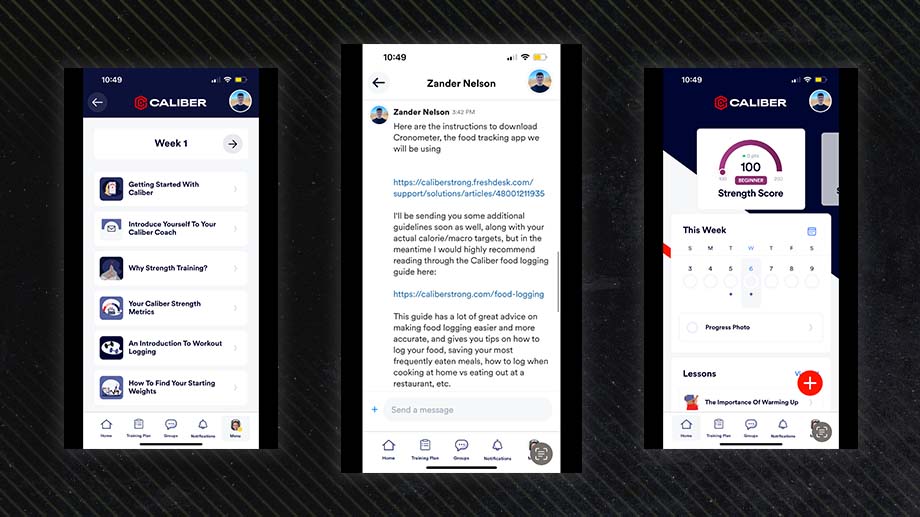
Additionally, workout apps can be helpful in tracking your progress throughout your journey. Having a backlog of data can paint a solid picture of where you started, what needs improvement, and what to focus on in future workouts. Plus, these services often craft a more digestible library of previous accomplishments than what you’d be able to create through errant notes or archaic pen and paper tracking (although both can still be beneficial).
[Related: Should You Keep a Training Journal? Their Pros and Cons]
Convenience
When you have a workout app downloaded to your trusted device, you’re never left without a planned daily workout or library of classes to choose from. This can make it easier to find the time for a session throughout your day, as there’s no need to hash out a plan before getting to your home gym or training center.
Plus, some platforms offer specific filters to help you find the ideal session for your needs. If you’re wanting to practice a high-intensity interval training workout, you can just search for available HIIT templates or classes instead of researching movements on your own or finding open courses at your gym that align with your schedule.
Accountability
A good training program is one that you stick with on a regular basis. Try as we might, though, there are days where motivation is lacking to get your workouts in. Quality workout apps can help you stay diligent with exercises through well-executed notifications and even regular check-ins with a prescribed coach (if the app offers such interactivity).
You can also view the accountability benefit of workout apps for men solely through the actual investment you’re making for access to the platform. Many of the top services require a subscription, and if you’re paying for an app, odds are you’ll use its features more so than that free game you downloaded years ago.
Finally, many workout apps for men do a great job of giving kudos to accomplishments, either through congratulatory emails after hitting a goal or awarding you a (digital) trinket for your time spent on the platform. Having this extra sense of positivity baked into your training routine can do wonders for staying on the ball day in and day out. Studies show that a positive relationship with training can make it easier to hit your aspirations in the long run. (4)
What to Consider Before Choosing a Workout App for Men
Like any service you’d find in your respective App Store, there are a ton of workout apps on the market. As such, there are a handful of factors to think about before subscribing to a given platform. Below are some worthwhile considerations to have when deciding on a digital program for your next workout.
Fitness Aspirations
When choosing a workout app, you’ll want to match the service to your personal fitness goals. Whether you want to build muscle, lose weight, or simply make working out more convenient, you’ll want to go with a platform that provides the tools necessary for a worthwhile fitness journey.
Training Discipline
Additionally, you’ll want to download a fitness app that actually provides workouts in your preferred discipline. For example, if you’re a devout runner, odds are you’re not going to enjoy your experience with a program based around strength training. Be sure your programming is aligned with your interests — many apps cater to a wide range of fitness activities, while others are more specific with plans for solely yoga, running, powerlifting, or other regimens.
Equipment Availability
Your workout app isn’t the only tool you’ll be using in training. Some programs and digital services require access to a variety of fitness equipment, so you’ll want to be sure you can actually complete the prescribed workouts with the gear you have on hand.
If you’re less equipped or want to focus on bodyweight exercises, there are apps that feature workouts designed for such needs. Additionally, if your workout app offers personalized training regimens with the help of a coach, you can often curate your plan around your available equipment. In the end, though, make sure your tools are in order before hitting download — there’s no sense in having an app that requires access to a barbell and free weights if you have no way of getting ahold of them.
App Compatibility
It goes without saying, but your chosen workout app should be able to operate on your operating system of choice. This is an easy enough factor to determine — simply search for your desired app in the Apple App Store or Google Play Store. You can also search online for the app’s dedicated home page. The brand or parent company will typically feature links to the respective marketplaces for more convenient downloads.
Price
While some workout apps are free to download, many operate through a subscription-based model. These memberships can range in price, with some platforms charging $200 per month and beyond. As with any fitness-related purchase, make sure that you can comfortably invest the required coin into the service each month.
Additionally, some workout apps offer a free trial period before subscriptions become due. This can be a great convenience to have, especially if you’re in-between two or more platforms. When taking advantage of these free trial periods, make sure to pay attention to the listed duration. You don’t want to have to end up paying for a monthly charge that you have no interest in down the road.
Final Word
The best workout apps for male athletes can provide a quick, convenient way to take your training to the next level, especially those intimidated by looking inexperienced in a workout. (5) Whether looking for a customized workout routine designed and monitored with the help of a dedicated personal trainer, a specific platform catering to your interests in cardio or yoga, or just a library of workouts and training journals to make data tracking more convenient, there’s no shortage of services available today.
When considering which workout app is right for you, be sure to think about your personal fitness goals, how you intend to train, and what you’d like your experience to showcase with the app itself. Additionally, think about your setup beyond your phone — will you need extra fitness equipment or a full-fledged gym membership, or can the workout library be completed with your current setup? Using this round-up as a guide, you can be well on your way to crafting the perfect toolbox for your next workout.
FAQs
Are workout apps for men worth it?
Value is in the eye of the beholder when it comes to workout apps for men. Plenty of athletes have found success in utilizing platforms such as the ones listed in this guide, while others may feel the services aren’t worth the placement across their home screens. When determining whether a workout app is right for your fitness goals, be sure to think about how much you plan to use such a service, along with your preferred method of working out.
What is the best workout app for men?
Determining the best workout app for men can be a subjective subject, depending on your training goals and fitness needs. For our time and money, we recommend Future thanks to its one-on-one personal training capabilities, intuitive user interface, and exceptional accountability through regular check-ins and coach-led conferences.
How much do workout apps for men cost?
The landscape of workout apps for men varies greatly when it comes to cost. Some platforms are completely free, while others charge upwards of $200 per month. In the end, it’s always wise to look at your budget before downloading a specific service.
References
- Mahaffey, K. (n.d.). How much does a personal trainer cost & should you hire one?. NASM. https://blog.nasm.org/how-much-does-a-personal-trainer-cost
- Plotkin, D., Coleman, M., Van Every, D., Maldonado, J., Oberlin, D., Israetel, M., Feather, J., Alto, A., Vigotsky, A. D., & Schoenfeld, B. J. (2022). Progressive overload without progressing load? the effects of load or repetition progression on muscular adaptations. PeerJ, 10.
- Cagas, J. Y., Biddle, S. J., & Vergeer, I. (2022). For exercise, relaxation, or spirituality: Exploring participation motives and conformity to masculine norms among male and female yoga participants. International Journal of Environmental Research and Public Health, 19(2), 770.
- Hagberg, L. A., Lindahl, B., Nyberg, L., & Hellénius, M. ‐L. (2009). Importance of enjoyment when promoting physical exercise. Scandinavian Journal of Medicine & Science in Sports, 19(5), 740–747.
- Levinson, C. A., Rodebaugh, T. L., Menatti, A. R., & Weeks, J. W. (2012). Development and validation of the social exercise and anxiety measure (seam): Assessing fears, avoidance, and importance of social exercise. Journal of Psychopathology and Behavioral Assessment, 35(2), 244–253.
- 3 key insights from personal training clients. IHRSA. (n.d.). https://www.ihrsa.org/improve-your-club/3-key-insights-from-personal-training-clients/
- Nuzzo, J. L. (2020). Sex difference in participation in muscle-strengthening activities. Journal of Lifestyle Medicine, 10(2), 110–115. https://www.ncbi.nlm.nih.gov/pmc/articles/PMC7502892/
The post The 10 Best Workout Apps for Men of 2024 appeared first on BarBend.

